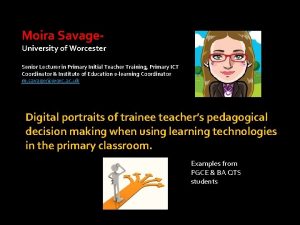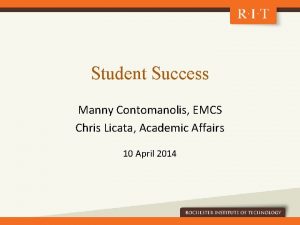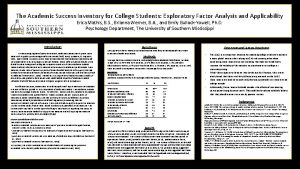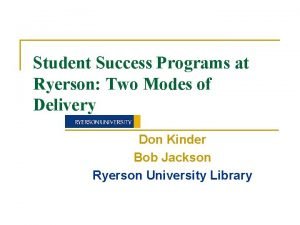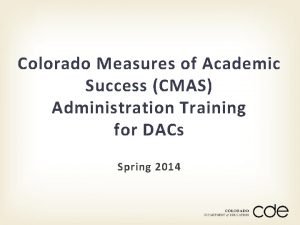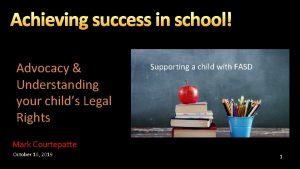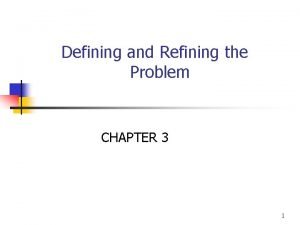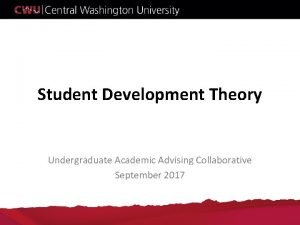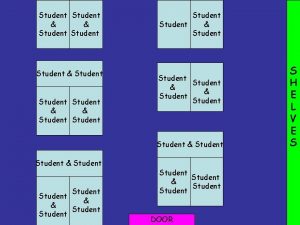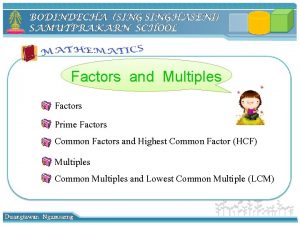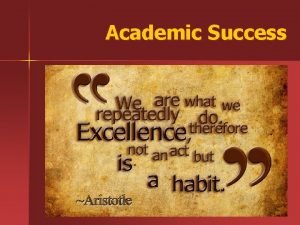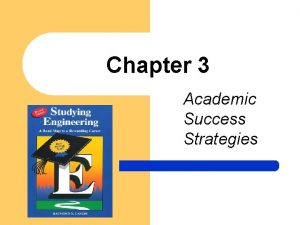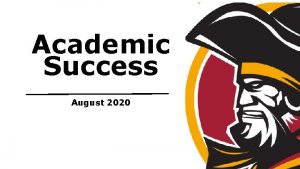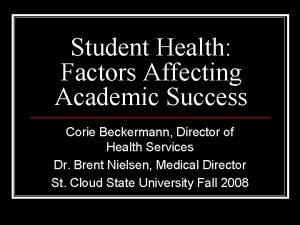Factors facilitating academic success a student perspective Moira
















- Slides: 16

Factors facilitating academic success: a student perspective Moira Cachia, M. , Lynam, S. , Stock, R. , Fern-Pollak, L. , Usher, L. & Hunt, F. School of Human & Social Sciences

Research background • Intellectual ability is the most recognised predictor of cognitive ability (Neisser et al. , 1996). • Achievement motivation is also considered as an important predictor within academic settings (Dweck, 1986). • Certain personality traits (such as emotionality and conscientiousness) correlate positively with good student grades (Mahaela, 2015).

Rationale • Research on the topic is scarce and mostly from a quantitative approach, using survey methodology. • A qualitative study with 79 1 st year Psychology students in South Africa uses the Self-Determination Theory (Deci & Ryan, 1985, 2008) as its theoretical framework (Naude et al. , 2016). They conclude that students need to move from an external to an internal locus of control in order to facilitate success. • The current study is conducted with students at the end of their Level 5 or 6, the rationale being that these participants would have had at least two years of experience as university students.

Aims As academics, we spend time and energy trying to find ways to help our students enhance their academic performance, and looking for ways to support their learning. The outcome of this study is aimed at informing our practice when planning teaching and learning activities. This study considers students as our research partners who have the expert knowledge of what factors contribute to their academic success.

Research Questions How do university students define academic success? What factors do students perceive as facilitators of their academic success?

Method • 3 Focus groups of 1 -1. 5 hour each were conducted in a seminar room in the Psychology Department. • The focus groups were all led by the same two researchers. • A semi-structured interview guide was used • Each session was audio recorded for transcription purposes. • Thematic analysis was conducted (Braun & Clarke, 2008), taking an inductive approach.

Participants 16 Psychology students (5 male; 11 females) 19 to 53 years of age (Mean: 29; Mode 19) 13 Home students, 2 EU, 1 International student Average grade: 4 first class; 11 2: 1; and 1 2: 2 grade All students were given points for participation (Research Participation Scheme).

What is academic success? A summary of the participants’ understanding of academic success is: gaining skills and knowledge through the university learning process, giving priority to personal development and the professional achievement of a university qualification. …to feel happy in that environment and to feel that you are achieving and growing as an individual as well. I think it’s getting as much information and applying it in life as much as you could, more than doing good at an exam… …understanding yourself, knowing who you are and your place in the world and how you impact on other people…

Focus Group Exercise

Thematic Analysis Theme 1: Internal Factors • Self-Management • Motivation • Personal skills Theme 2: External Factors • Support • Teaching provision

Theme 1: Internal Factors Self. Management • “If you don’t understand the work you need to go back to the lecturer or use the Internet or use books. Stop blaming it on others and start being responsible for your actions. ” Motivation • “I think starting with higher education, it should be something that makes you willing to keep on going, keep on researching, keep on informing yourself. I think that’s the success in higher education. ” Personal Skills • “Time management is… giving time to some things that you want to do, and organisation is making yourself do something, making the choice… it’s not always an easy choice to make.

Theme 2: External Factors Support • “Family support… It’s an emotional support because they are always behind me, they are always checking with my course work, with my assignment exams, I’m doing well, I’ve got the books I need, do I need something else. This support is a good 50% of what keeps me going, honestly. ” Teaching Provision • “Being able to contact lecturers… they’re really good at replying and they’re detailed enough so they’re not giving you the answer, you still have to think, but it points you in the right directions…”

Discussion • Self-management relates to the previously identified internal locus of control as a requirement for academic success (Naude et al. , 2016). • Motivation and Personal skills are individual characteristics that can be identified and developed. • There is an interplay between internal and external factors. • Academic success is a complex construct with multiple facets.

Implications • Course and module leaders must note that students’ personal and professional development (such as skills training) needs to be integrated within higher education programmes. It cannot be assumed that certain skills such as time management and assertiveness are self-taught. • Learning and teaching activities must not be a “one size fits all” matter but the particular student group’s needs must be taken into consideration. For instance, implementing a midmodule evaluation allows for the adaption of learning activities according to the feedback received from the students.

Reflexivity • This study is conducted with Psychology students. Studies with other samples would generate an understanding with other student groups. • The focus groups were led by Psychology lecturers who taught and assessed the participants at the time of the study, which might have influenced the data. • All participants were actively engaged on the programme, attending lectures/seminars regularly and submitting all their assessments when due. Therefore this study does not necessarily provide insight on how the weaker students can be supported.

Thank you Any Questions or comments?
 Factors that influence communication
Factors that influence communication Moira savage
Moira savage Moira fischbacher-smith
Moira fischbacher-smith Moira hindley
Moira hindley Moira king
Moira king Webmoira
Webmoira Manny contomanolis
Manny contomanolis Isu academic success center
Isu academic success center Academic success inventory for college students
Academic success inventory for college students Academic success center tamu
Academic success center tamu Continuing academic success
Continuing academic success Ryerson academic success centre
Ryerson academic success centre Test nav colorado
Test nav colorado Your child's success or lack of success
Your child's success or lack of success Your child's success or lack of success
Your child's success or lack of success Broad problem area in research examples
Broad problem area in research examples Applying student development theory
Applying student development theory

